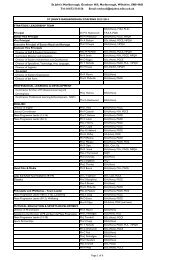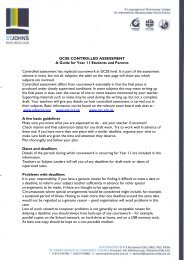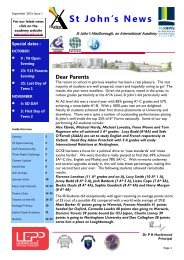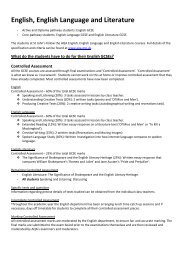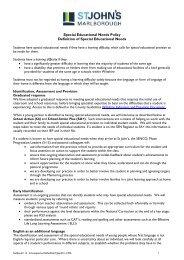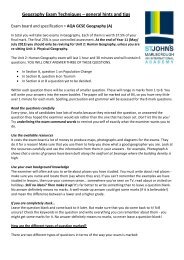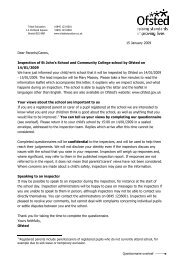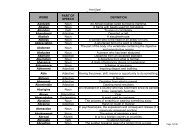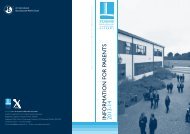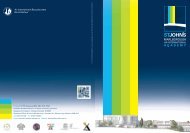Sex Education Policy - St John's School and Community College
Sex Education Policy - St John's School and Community College
Sex Education Policy - St John's School and Community College
Create successful ePaper yourself
Turn your PDF publications into a flip-book with our unique Google optimized e-Paper software.
<strong>St</strong> John’s <strong>School</strong> <strong>and</strong> <strong>Community</strong> <strong>College</strong>, Marlborough<br />
SCHOOL SEX EDUCATION POLICY<br />
1. Aims of <strong>Sex</strong> <strong>Education</strong><br />
<strong>St</strong> John’s <strong>School</strong> <strong>and</strong> <strong>Community</strong> <strong>College</strong> believes that sex education is an educational<br />
entitlement of all pupils <strong>and</strong> an integral part of each pupil’s emergence into adulthood.<br />
We aim:<br />
To encourage personal responsibility in all forms of behaviour;<br />
To encourage self-esteem;<br />
To encourage respect <strong>and</strong> consideration for others;<br />
To provide support <strong>and</strong> information for young people <strong>and</strong> their parents;<br />
To promote openness <strong>and</strong> discussion on related issues in <strong>and</strong> out of school.<br />
The aim of this policy is to clearly communicate to staff, parents, visitors, the community <strong>and</strong><br />
pupils the manner in which sex education will be delivered in this school.<br />
2. Content<br />
<strong>Sex</strong> <strong>Education</strong> provides knowledge <strong>and</strong> encourages the acquisition of skills <strong>and</strong> attitudes, which<br />
allows pupils to manage their lives in a responsible <strong>and</strong> healthy way.<br />
a) Knowledge <strong>and</strong> information<br />
Key <strong>St</strong>age 3 Key <strong>St</strong>age 4 – see appendix 1<br />
b) Values <strong>and</strong> beliefs<br />
Pupils will be encouraged to consider the importance of the following values:<br />
Respect <strong>and</strong> valuing themselves <strong>and</strong> others;<br />
Underst<strong>and</strong>ing <strong>and</strong> sensitivity towards the needs <strong>and</strong> views of others;<br />
Responsibility for their own actions;<br />
Responsibility to the school, their family <strong>and</strong> the wider community.<br />
c) Skills <strong>and</strong> abilities<br />
Pupils will be helped to develop the following skills:<br />
Communication including the making <strong>and</strong> keeping of relationships;<br />
Assertiveness;<br />
Decision-making;<br />
Recognising <strong>and</strong> using opportunities to develop a healthy lifestyle.
3. Organisation<br />
a) <strong>Sex</strong> <strong>Education</strong> is co-ordinated by the Director of Health. The Well-being <strong>and</strong> Science teams are<br />
responsible for the overall planning, implementation <strong>and</strong> review of the sex education<br />
programme.<br />
b) Delivery is through<br />
Planned aspects within the Science, Well Being <strong>and</strong> Philosophy <strong>and</strong> Religion curricula;<br />
Addressing moral <strong>and</strong> ethical issues which may arise from apparently unrelated topics in all<br />
subjects. Within this category, as long as any discussion takes place within the context of<br />
the subject, it will not be deemed to be part of the sex education programme <strong>and</strong> therefore<br />
not subject to the parental right of withdrawal.<br />
Assemblies which may involve guest speakers.<br />
c) Teaching approaches<br />
A variety of approaches are used to give pupils relevant information; to enable moral issues to<br />
be explored through discussion; <strong>and</strong> to acquire appropriate skills.<br />
d) Pupil groupings<br />
Pupils are taught in mixed ability <strong>and</strong> gender groups.<br />
e) Resources<br />
Materials – a range of teaching resources is available to teachers <strong>and</strong> for inspection by<br />
parents through the Director of Health.<br />
<strong>St</strong>aff – All staff are asked to teach within the school’s value framework as set out in<br />
paragraph 2(b).<br />
4. Specific Issues<br />
See attached sheet.<br />
5. Monitoring <strong>and</strong> Review<br />
a) <strong>Sex</strong> education will be monitored by the Director of Health<br />
b) The full policy will be made available to all parents/guardians when their child enters the school.<br />
c) The Chair of the ECM committee has a link role between the school <strong>and</strong> the governing body<br />
APPENDICIES:<br />
• Overview of the scheme of work<br />
• Sheet of Specific Issues<br />
Reviewed: June 2011<br />
Next Review: January 2013<br />
Link Governor: Chair of ECM committee<br />
Responsibility: ANS
Scheme of Work<br />
<strong>St</strong> John’s <strong>School</strong> <strong>and</strong> <strong>Community</strong> <strong>College</strong>, Marlborough<br />
SCHOOL SEX EDUCATION POLICY<br />
APPENDIX 1<br />
Science Key <strong>St</strong>age 3 <strong>St</strong>udents should be taught:<br />
About the physical <strong>and</strong> emotional changes that take place during<br />
adolescence;<br />
About the human reproductive system, including the menstrual cycle<br />
<strong>and</strong> fertilisation;<br />
How the foetus develops in the uterus, including the role of the<br />
placenta.<br />
Key <strong>St</strong>age 4<br />
<strong>St</strong>udents should be taught:<br />
The way in which hormonal control occurs, including the effects of<br />
sex hormones;<br />
Some medical uses of hormones, including the control <strong>and</strong><br />
promotion of fertility;<br />
How gender is determined in humans;<br />
That sexual reproduction is a source of genetic variation, while<br />
asexual reproduction produces clones.<br />
<strong>Sex</strong> <strong>Education</strong><br />
Based on <strong>Sex</strong> <strong>Education</strong> Curriculum KS3 <strong>and</strong> 4<br />
The sex education programme at <strong>St</strong> John’s will include lessons assemblies <strong>and</strong> information on the<br />
following, appropriate to the age <strong>and</strong> underst<strong>and</strong>ing of the pupils. The content will be delivered<br />
progressively through the Key <strong>St</strong>ages; the list below is not intended to represent an order of priorities<br />
or to be exhaustive:<br />
Key <strong>St</strong>age 3<br />
Adolescence <strong>and</strong> puberty – growing up;<br />
Menstruation;<br />
Personal relationships – loving <strong>and</strong> caring;<br />
Problems in relationships;<br />
Conception, pregnancy;<br />
Contraception (preventative health care);<br />
Biological aspects of reproduction;<br />
<strong>Sex</strong>ually transmitted infections- including HIV <strong>and</strong> AIDS;<br />
<strong>Sex</strong>uality.<br />
Key <strong>St</strong>age 4<br />
Moral <strong>and</strong> values framework;<br />
Partnership, marriage <strong>and</strong> divorce;<br />
The impact of loss separation <strong>and</strong> bereavement;<br />
Abortion;<br />
<strong>Sex</strong>ually transmitted diseases – including HIV <strong>and</strong> AIDS;<br />
Parenthood <strong>and</strong> childcare;<br />
The law on sexual behavior.
<strong>St</strong> John’s <strong>School</strong> <strong>and</strong> <strong>Community</strong> <strong>College</strong>, Marlborough<br />
SCHOOL SEX EDUCATION POLICY<br />
SPECIFIC ISSUES<br />
APPENDIX 2<br />
The following issues may occur as part of sex education. <strong>St</strong>aff, parents <strong>and</strong> students need to underst<strong>and</strong> the<br />
school’s procedures.<br />
1. Confidentiality <strong>and</strong> advice<br />
<strong>St</strong>udents will be offered sensitive <strong>and</strong> appropriate support;<br />
<strong>St</strong>udents will be made aware that some information cannot be held as confidential;<br />
<strong>St</strong>udents will be made aware that if certain disclosures are made certain actions will ensue.<br />
All adults will adhere to the following procedure:<br />
a) Disclosure or suspicion of possible abuse -<br />
The school’s child protection procedures will be invoked.<br />
b) Disclosure of pregnancy or advice on contraception -<br />
It is hoped that the following procedure will ensure that students know that they can talk to an adult<br />
in the school <strong>and</strong> that they will be supported.<br />
Professional information <strong>and</strong> guidance may be sought from a health professional.<br />
The school will always encourage students to talk to their parents first:<br />
<strong>St</strong>udents should be asked whether they can tell their parent(s)/guardian(s) <strong>and</strong> whether they<br />
want help in doing so. This disclosure to home will need to be checked;<br />
If students refuse to tell their parent(s)/guardian(s) the school should refer them to a health<br />
professional;<br />
The member of staff should report the incident to the Headteacher who will consult with the<br />
health professional about informing the parent(s)/guardian(s).<br />
2. Family life<br />
The value of family life is an important aspect, which will be approached largely through a consideration of<br />
the relationships between the group of people, with an emphasis on stability, respect, caring <strong>and</strong> support.<br />
3. As part of the sex education programme issues of contraception, HIV/AIDS, sexuality <strong>and</strong> abortion are<br />
addressed. Facts are presented in an objective <strong>and</strong> balanced way, with the students being encouraged to<br />
consider their attitudes <strong>and</strong> values within the framework set out in paragraph 2(b) of the main policy.<br />
They will be made aware of the difference between fact, opinion <strong>and</strong> religious belief.<br />
4. Complaint procedure<br />
Any complaints about the sex education curriculum should be made to the Headteacher who will report<br />
to the school governing body via the Chair of the ECM committee.<br />
5. Parental partnership<br />
Under the <strong>Education</strong> Act 1993 parents/guardians have the right to withdraw their children from all or<br />
part of the sex education programme. Parents/Guardians wishing to exercise that right are asked to make<br />
an appointment to meet the Headteacher or delegated teacher to discuss the issues, they are under no<br />
obligation to do so. Once a child has been withdrawn they cannot take part in later sex education<br />
without parental approval.<br />
The school newsletter can be used to inform parents/guardians of developments in the area of sex<br />
education within the school. It is hoped that the newsletter will help promote an open dialogue at home<br />
about related issues being dealt with in the sex education curriculum.




